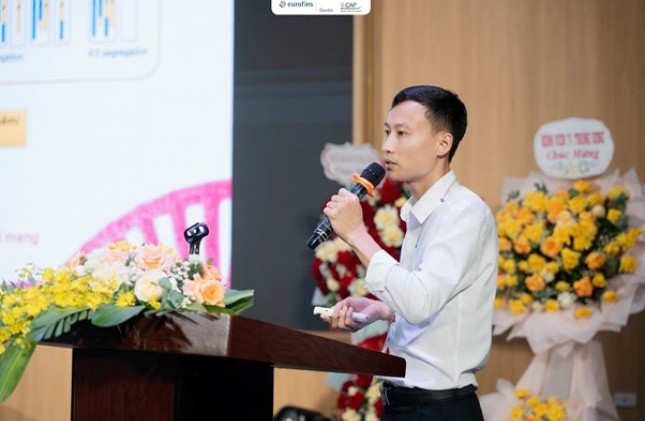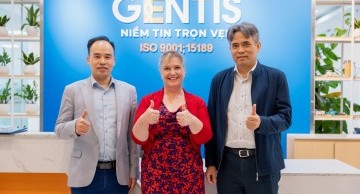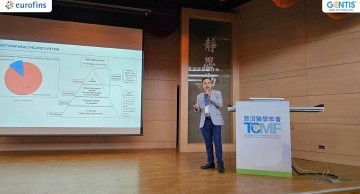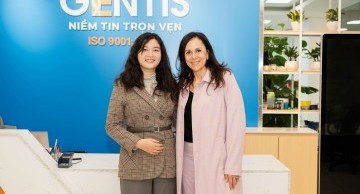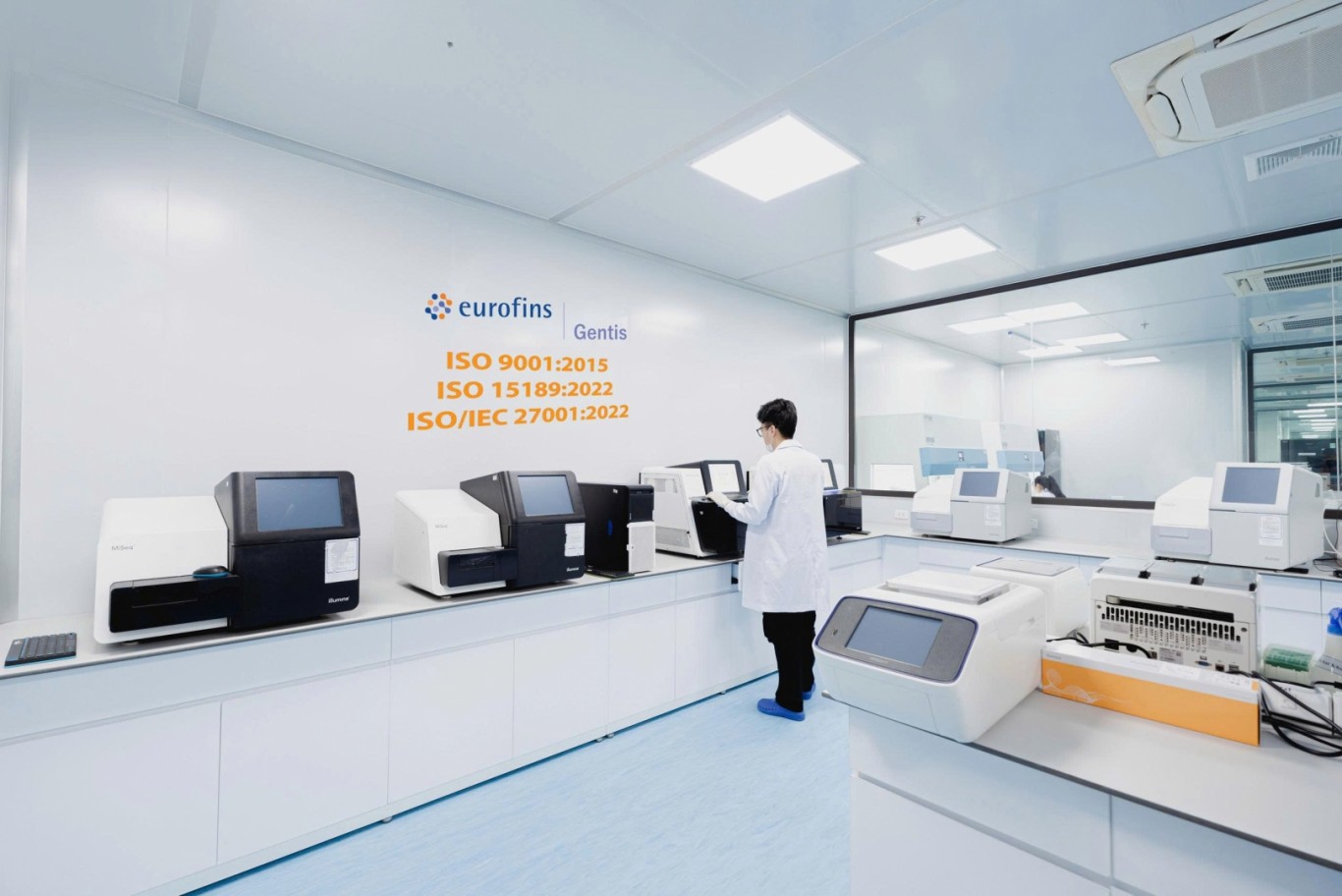
Expert opinion
Array
(
[0] => stdClass Object
(
[id] => 1341
[id_crawler] =>
[category_product] => NULL
[thumbnail] => 2-1752034596.jpg
[album] =>
[url_video] =>
[is_status] => 1
[is_featured] => 0
[is_form] => 0
[displayed_time] => 2025-07-12
[program] => 0
[number] => 1
[viewed] => 0
[type] =>
[type_career] =>
[level] =>
[address] =>
[address_career] =>
[expiration_time] => 0000-00-00
[created_time] => 2025-07-12 10:15:24
[updated_time] => 2025-09-08 15:05:50
[files] =>
[salary] =>
[time] =>
[created_by] => 63
[is_table_content] => 1
[language_code] => en
[slug] => Diagnosis-and-treatment-of-genetic-diseases-advances-and-new-solutions-
[title] => Diagnosis and Treatment of Genetic Diseases: Advances and New Solutions
[description] => The diagnosis and treatment of genetic diseases have become one of the most rapidly advancing fields in medicine, bringing new hope to millions of patients around the world. With the development of technology, from early diagnostic techniques to optimized treatment methods, the detection and management of genetic disorders have become more accurate and effective than ever. These groundbreaking solutions not only improve patients' quality of life but also lay a solid foundation for the future.
[content] => Detecting Balanced Translocations in Preimplantation Embryos Using PGT Technology
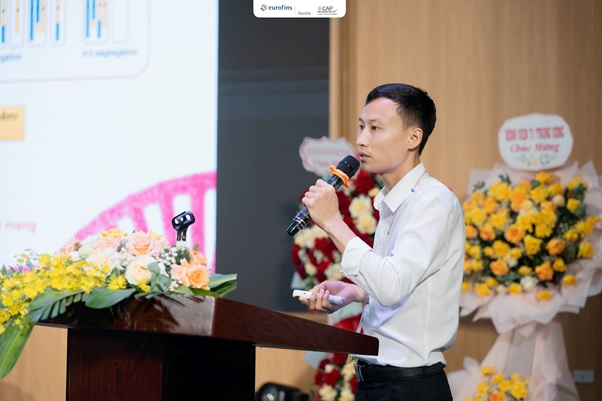
MSc. Nguyen Van Huynh (GENTIS Specialist) presented the advantages of PGT-UPGRADE testing.
The detection and analysis of balanced translocations in preimplantation embryos are opening a new chapter in the search for "healthy seeds of life" for couples undergoing infertility treatment. This advanced technique enables the screening of potential genetic abnormalities from the earliest stages of embryonic development, allowing for precise selection of the best embryos for uterine transfer.
One of the most notable breakthroughs today is PGT-UPGRADE—a deep genetic analysis method developed by GENTIS using international-standard Next-Generation Sequencing (NGS) technology. In addition to comprehensively detecting aneuploidy across all 24 chromosomes, PGT-UPGRADE is specialized in identifying genetic balanced translocations—a factor that conventional tests often miss but may be the root cause of recurrent miscarriages, IVF failure, or congenital abnormalities.
In clinical practice, PGT-UPGRADE helps screen and select embryos that do not carry the same balanced translocation as either parent, thereby minimizing the risk of passing genetic abnormalities to the next generation and eliminating reproductive complications caused by such translocations. It is the optimal solution for couples with balanced translocations—allowing proactive selection of genetically normal embryos, increasing IVF success rates, reducing pregnancy risks, and offering the chance of welcoming a healthy baby.
Zygote Formation Abnormalities in IVF and Detection Methods
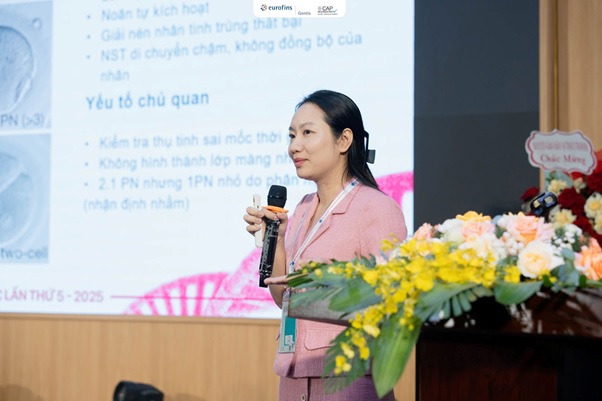
Dr. Bui Thi Phuong Hoa (Head of Research and Training Department – Hanoi Hospital of Andrology and Infertility) presented on abnormalities during in vitro fertilization and their detection.
In IVF procedures, abnormalities in zygote formation are one of the main causes of implantation failure and unsuccessful pregnancies. These may include chromosomal number anomalies or genetic mutations that lead to severe disorders.
Today, the detection of such abnormalities relies heavily on advanced genetic testing technologies such as chromosomal analysis using NGS or CGH array methods. These tests allow early detection of abnormalities that might affect IVF success, enabling physicians to make appropriate decisions in selecting healthy embryos for transfer.
With support from these modern detection methods, IVF failure rates have significantly decreased. This not only helps families save time and costs but also minimizes the risk of passing hereditary diseases to their children. The increasing accuracy of these methods is building strong trust among couples on their journey to parenthood.
Developing Interpretation Software for Newborn Screening Using LC-MS/MS
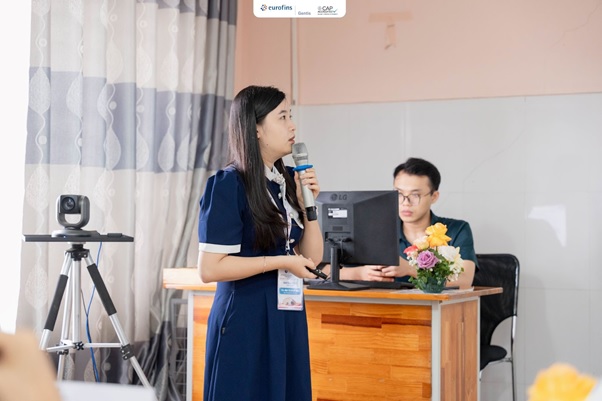
MSc., Resident Doctor Dinh Thi Quynh Ngoc (GENTIS Specialist) reported on the development of interpretation software for newborn screening results using the LC-MS/MS method.
Newborn screening is one of the key measures for early detection of genetic and congenital metabolic disorders that can seriously affect the health and development of infants. Among screening techniques, Tandem Mass Spectrometry (UPLC-MS/MS) is increasingly becoming a modern method for accurately identifying abnormalities from birth. However, one of the current major challenges is result interpretation—which requires a combination of high precision and rapid processing speed.
To meet this need, the development of interpretation software for newborn screening using mass spectrometry has emerged as a breakthrough in enhancing healthcare service quality. These software solutions automate the entire data analysis process and assist doctors in making timely and accurate clinical decisions—from monitoring to treatment.
In particular, leading institutions in genetics in Vietnam, such as GENTIS, are investing in building advanced interpretation systems that optimize analysis performance and reduce errors during result reading. The participation of experienced units like GENTIS not only enhances the reliability of screening systems but also promotes the application of high technology in precision medicine in Vietnam.
GENTIS – A Trusted Partner in the Diagnosis and Treatment of Genetic Disorders
GENTIS has established itself as a pioneer in genetic technology research and application, providing accurate testing services along with diagnostic and treatment support software. With advanced technologies and a team of experienced experts, GENTIS remains a reliable partner for hospitals, clinics, and genetic research centers. In addition to developing technical solutions, GENTIS also offers consultation to support physicians and families throughout the treatment process.
Thanks to continuous technological advances, methods such as PGT, newborn screening using mass spectrometry, and result interpretation software are transforming how genetic diseases are diagnosed and treated. As a leader in genetic testing, GENTIS not only improves healthcare quality but also helps reduce the prevalence of preventable genetic conditions.
[content_more] =>
[meta_title] => Diagnosis and Treatment of Genetic Diseases: Advances and New Solutions
[meta_description] => The diagnosis and treatment of genetic diseases have become one of the most rapidly advancing fields in medicine, bringing new hope to millions of patients around the world.
[meta_keyword] => GENTIS,genetic
[thumbnail_alt] =>
[post_id] => 1341
[category_id] => 16
)
[1] => stdClass Object
(
[id] => 1335
[id_crawler] =>
[category_product] => NULL
[thumbnail] => cac_logo-02.jpg
[album] =>
[url_video] =>
[is_status] => 1
[is_featured] => 0
[is_form] => 0
[displayed_time] => 2025-07-07
[program] => 0
[number] => 1
[viewed] => 0
[type] =>
[type_career] =>
[level] =>
[address] =>
[address_career] =>
[expiration_time] => 0000-00-00
[created_time] => 2025-07-07 15:04:01
[updated_time] => 2025-09-08 15:06:29
[files] =>
[salary] =>
[time] =>
[created_by] => 63
[is_table_content] => 1
[language_code] => en
[slug] => Eurofins-GENTIS-a-milestone-in-bringing-Vietnamese-genetic-science-to-the-global-stage
[title] => Eurofins GENTIS – A Milestone in Bringing Vietnamese Genetic Science to the Global Stage
[description] => From a startup in France, Eurofins has grown into one of the world’s leading scientific groups, particularly in the field of biological testing, including medical testing, with over 900 laboratories worldwide. The integration of GENTIS into the Eurofins network marks a strategic turning point, ushering in a new era for genetic testing in Vietnam and Southeast Asia.
[content] => Eurofins – A Global Leader in Scientific Services
Eurofins Scientific is a world-leading group specializing in testing, inspection, and certification services for quality management systems across food, consumer products, environment, pharmaceuticals, and genetic analysis. Founded in October 1987 in Nantes, France with just four employees, Eurofins began as a young science-based company. From the very beginning, Eurofins set a clear vision – "Testing for Life" – contributing to scientific progress and protecting public health.

After more than three decades of rapid growth, Eurofins has become one of the largest scientific service providers in the world, with:
-
Over 62,000 employees across more than 900 laboratories globally
-
A leading position in testing for food, pharmaceuticals, cosmetics, agriculture, and a strong presence in advanced fields such as materials science, genomics, forensics, consumer products, and clinical diagnostics
-
Operations in over 62 countries, forming a cross-border scientific network where technological advances are shared, applied, and optimized with a shared mission: To make the world a safer, healthier place to live
This remarkable growth is not only about scale but also embodies the Eurofins spirit – a unique identity in the scientific community characterized by continuous innovation, investment in technology, service quality enhancement, and most importantly, a commitment to building a safer, healthier world. Eurofins affirms its leadership in innovation, accuracy, and quality in life sciences – continually setting global trends and standards. It is home to some of the brightest minds, always at the forefront of research, technological applications, and global standard development.
GENTIS – A Vietnamese Mark in the Global Eurofins Network
In February 2022, GENTIS officially joined the global Eurofins family – a historic milestone for life sciences in Vietnam, as a pioneer in genetic analysis became part of one of the world’s leading healthcare groups.
The integration of GENTIS into Eurofins is not merely an expansion in scale but a strategic connection between a powerful international corporation and a Vietnamese pioneer in genetic testing.
As a trailblazer in Vietnam specializing in genetic and DNA testing, GENTIS has established a leading position with millions of trusted customers, a team of experts, and laboratories that meet international standards.
The transformation of Eurofins GENTIS into a foreign-invested company carries profound strategic significance:
-
Access to world-leading technologies, improving testing capacity and service quality
-
Participation in a global scientific research network, expanding professional collaboration and sharing international knowledge
-
Bringing high-quality genetic testing services closer to the Vietnamese population, contributing to better public healthcare
At the same time, GENTIS will become a strategic hub for Eurofins in Southeast Asia, contributing to the group's ambition to expand genetic testing services in this highly potential region.
Eurofins GENTIS – Strong Leadership, Forward to the Future
Eurofins GENTIS represents the synergy of global strength and local expertise – combining international stature with deep local understanding. This perfect integration aims to bring advanced genetic testing services to millions of people in Vietnam and the region.

With Eurofins' global technology, team, and network, along with a solid scientific foundation, Eurofins GENTIS officially enters a new stage of development – becoming a pioneer in genetic analysis, leading Vietnam, and aiming to lead Southeast Asia.
[content_more] => [meta_title] => Eurofins GENTIS – A Milestone in Bringing Vietnamese Genetic Science to the Global Stage [meta_description] => From a startup in France, Eurofins has grown into one of the world’s leading scientific groups, particularly in the field of biological testing, including medical testing, with over 900 laboratories worldwide. [meta_keyword] => GENTIS,Eurofins [thumbnail_alt] => [post_id] => 1335 [category_id] => 16 ) [2] => stdClass Object ( [id] => 1300 [id_crawler] => [category_product] => NULL [thumbnail] => 6e65830d266c9532cc7d.jpg [album] => [url_video] => [is_status] => 1 [is_featured] => 0 [is_form] => 0 [displayed_time] => 2025-04-09 [program] => 0 [number] => 1 [viewed] => 0 [type] => [type_career] => [level] => [address] => [address_career] => [expiration_time] => 0000-00-00 [created_time] => 2025-04-09 09:16:44 [updated_time] => 2025-09-08 15:13:26 [files] => [salary] => [time] => [created_by] => 63 [is_table_content] => 1 [language_code] => en [slug] => Gentis-accompanies-the-art-advanced-12-conference-new-perspectives-on-reproductive-science-from-clinical-data-to-personalized-treatment [title] => GENTIS accompanies the ART ADVANCED 12 Conference: “New perspectives on reproductive science: from clinical data to personalized treatment” [description] => The ART ADVANCED 12 conference is a significant scientific event in the field of reproductive support organized by the Hanoi Reproductive Support Association. With the theme “New Perspectives on Reproductive Science: From Clinical Data to Personalized Treatment,” the conference will provide in-depth updates and important discussions about advances in reproductive support. This is an opportunity for experts to meet, share experiences, and move towards personalized treatment to improve clinical practice outcomes. [content] =>This year’s conference will take place on Friday, April 18, 2025, at the Pan Pacific Hotel Hanoi (1 Thanh Nien Road, Ba Dinh, Hanoi).

We are honored to accompany the conference as a sponsor. GENTIS’ booth will offer many exciting activities and attractive gifts for delegates. Additionally, the GENTIS booth will focus on presenting solutions for genetic screening and diagnosis in the field of reproductive support, particularly the three new PGT testing packages: PGT +100 rare diseases, PGT NEXT, and PGT UPGRADE.
One of the key advantages of PGT-M testing at GENTIS is the ability to analyze over 100 single-gene genetic diseases with high accuracy, allowing for the detection of even small DNA variants that may cause disease. By applying next-generation sequencing (NGS) technology combined with family-specific marker design, PGT-M ensures accuracy in identifying healthy embryos, thus increasing the chances of having a child free from genetic disorders. In addition to advanced technology, PGT-M for 100+ rare diseases also includes support from a dedicated genetic counseling team, accompanying patients before, during, and after testing.
PGT NEXT is a pre-embryo transfer genetic test capable of detecting aneuploidy on 24 chromosomes, additional abnormalities, and chromosomal deletions. It can also detect embryos with triploidy or monosomy. This helps avoid transferring embryos with these abnormalities, while also preventing wasting euploid embryos that have fertilization issues (0PN, 1PN, and 2.1/3PN). Additionally, PGT NEXT provides genetic information for embryo selection prior to transfer.
The combination of whole-genome sequencing (NGS) with SNP analysis enhances the resolution of genetic screening to detect aneuploidy. This method allows for the detection of monosomic and trisomic chromosomes, increasing the number of euploid embryos available for transfer by identifying truly diploid embryos among abnormal fertilized embryos (0PN, 1PN, 2.1PN, 3PN). Furthermore, SNP analysis ensures accurate identification of whether an embryo shares a genetic relationship with other embryos in the same group, reducing the risk of sample mix-ups due to procedural errors.
PGT UPGRADE is a pre-embryo transfer genetic test capable of detecting aneuploidy on 24 chromosomes, additional abnormalities, chromosomal deletions larger than 5 Mb, and particularly the ability to detect balanced translocations inherited from parents. Additionally, PGT UPGRADE provides genetic information for embryo selection before transfer.

At the conference, Dr. Pham Dinh Minh (Director of R&D at GENTIS) will present a report titled: "Factors Affecting the Outcome of Mosaic Embryos from a Genetic Lab Perspective."
We cordially invite doctors, embryologists, and experts to visit the GENTIS booth to update themselves on the most modern and advanced pre-implantation genetic screening solutions, serving the healthcare needs of the Vietnamese people.
[content_more] => [meta_title] => GENTIS accompanies the ART ADVANCED 12 Conference: “New perspectives on reproductive science: from c [meta_description] => The ART ADVANCED 12 conference is a significant scientific event in the field of reproductive support organized by the Hanoi Reproductive Support Association. [meta_keyword] => GENTIS,Conference [thumbnail_alt] => [post_id] => 1300 [category_id] => 16 ) [3] => stdClass Object ( [id] => 1297 [id_crawler] => [category_product] => NULL [thumbnail] => dsc02995.jpg [album] => [url_video] => [is_status] => 1 [is_featured] => 0 [is_form] => 0 [displayed_time] => 2025-04-04 [program] => 0 [number] => 1 [viewed] => 0 [type] => [type_career] => [level] => [address] => [address_career] => [expiration_time] => 0000-00-00 [created_time] => 2025-04-04 14:15:42 [updated_time] => 2025-09-08 15:14:31 [files] => [salary] => [time] => [created_by] => 63 [is_table_content] => 1 [language_code] => en [slug] => The-role-and-connection-between-clinical-doctors-geneticists-and-genetic-labs-in-diagnosis-and-screening-of-genetic-diseases [title] => The role and connection between clinical doctors, geneticists, and genetic labs in diagnosis and screening of genetic diseases [description] => In modern medicine, particularly in the diagnosis and screening of genetic diseases, the collaboration between clinical doctors, geneticists, and genetic laboratories plays an extremely important role. This is a closed-loop process that ensures patients receive accurate results, supporting the best treatment and prognosis possible. [content] =>The Importance of Genetic Testing in Diagnosis and Disease Screening
According to Ms. Katie Battese Ellis (Senior Director of Medical Affairs at Illumina in several APAC countries), in the past, there were not many available tests, so doctors often gathered the patient's characteristics to identify any potential issues. However, with the development of modern medicine, numerous genetic tests are now available, making the diagnosis and screening of diseases easier.
 Dr. Pham Dinh Minh, Ms. Katie Battese Ellis, and Associate Prof. Dr. Ho Sy Hung (from left to right)
Dr. Pham Dinh Minh, Ms. Katie Battese Ellis, and Associate Prof. Dr. Ho Sy Hung (from left to right)
With these advancements, we can conduct pre-pregnancy tests to see if both partners are carrying the same genetic condition. Pregnant women can undergo testing to monitor fetal development. Newborn screening tests can also be performed to detect conditions that may affect the health and development of the child later on.
From the test results, geneticists and clinical doctors will discuss and create a plan for better monitoring or treatment for the patient. This not only helps save time and treatment costs but also ensures the health and future happiness of the entire family.
As one of the leading experts in reproductive medicine in Vietnam, Associate Prof. Dr. Ho Sy Hung (Deputy Director of the National Reproductive Support Center) mentioned that the collaboration between genetic experts and clinical doctors is crucial. In reproductive medicine, the success rate of pregnancy is about 50%. However, some patients experience repeated miscarriages for unknown reasons, have a history of genetic diseases, or have undergone multiple IVF cycles without success. These cases require pre-implantation genetic testing (PGT) to select healthy embryos for implantation.
Currently, there are three types of traditional PGT tests: PGT-A, PGT-SR, and PGT-M. PGT-A helps identify normal embryos and increases the chances of success in IVF. PGT-SR can detect unbalanced translocations in embryos before transfer, allowing for the selection of normal embryos, thus increasing the chances of a successful pregnancy. PGT-M is used to screen for monogenic genetic diseases, ensuring that only embryos without genetic mutations are transferred.
GENTIS is a pioneering unit in Vietnam capable of accurately and professionally performing PGT tests with the most advanced techniques, along with a team of highly qualified experts. Notably, GENTIS can screen for about 100 monogenic diseases using PGT-M.
In addition, GENTIS also offers PGT NEXT and PGT UPGRADE with outstanding advantages. PGT NEXT can detect chromosomal abnormalities on all 24 chromosomes, additional abnormalities, chromosomal segment deletions, and aneuploidy. Meanwhile, PGT UPGRADE can detect chromosomal abnormalities, segment deletions, and balanced translocations inherited from parents.
.jpg) Experts Participating in the Genetic Counseling Talkshow – Discussion with Experts at GENTIS
Experts Participating in the Genetic Counseling Talkshow – Discussion with Experts at GENTIS
At GENTIS, PGT testing is conducted in an ISO-standard lab using advanced genetic sequencing methods like NGS, Sanger, or PCR, carried out by skilled technicians and experienced analysts. Afterward, geneticists provide the final conclusions and send them to clinical doctors for patient consultation, ensuring the transfer of healthy embryos into the mother's uterus.
According to Dr. Pham Dinh Minh, genetic and genomic testing is booming in Vietnam. Therefore, GENTIS needs the collaboration between doctors, geneticists, and labs to make genetic tests more accessible and useful, especially in reproductive medicine, obstetrics, and newborn screening.
In the near future, GENTIS will incorporate AI and bioinformatics to screen for more diseases and provide more clinical information to assist doctors in offering the best treatment options for patients.
The Connection Between Clinical Doctors, Geneticists, and Genetic Labs
The close collaboration between clinical doctors, geneticists, and genetic laboratories is crucial for the effectiveness of disease diagnosis and treatment. According to Ms. Katie, learning and sharing expertise is essential to strengthen cooperation among all parties.
Genetic labs should regularly update new tests, techniques, accuracy, and result turnaround times to ensure that clinical doctors and patients are better informed about the tests. This will help doctors develop the best treatment plan to save costs for patients.
 Dr. Minh took Ms. Katie on a tour of the GENTIS testing center
Dr. Minh took Ms. Katie on a tour of the GENTIS testing center
From the clinical doctor's perspective, Associate Prof. Dr. Hung pointed out that genetic issues are challenging for both general clinical doctors and obstetricians in particular. Since tests and techniques in reproductive medicine are constantly developing and changing, continuous learning is necessary to share knowledge and assist patients.
For genetic labs, the quality of testing is the key. Based on test results, doctors can accurately diagnose diseases and develop appropriate treatment plans. Therefore, to bring new, high-quality tests to the market, the support of not only medical experts but also geneticists and technology innovators is essential, as Dr. Minh emphasized.
Based on modern medical advancements and technological progress, genetic testing is increasingly becoming an essential tool for screening and diagnosing diseases. However, to ensure maximum effectiveness, clinical doctors, geneticists, and genetic labs must work closely together. Only by functioning as a unified system can the healthcare system provide the most accurate, personalized, and optimal care for patients.
[content_more] => [meta_title] => The Role and Connection Between Clinical Doctors, Geneticists, and Genetic Labs in Diagnosis and Sc [meta_description] => In modern medicine, particularly in the diagnosis and screening of genetic diseases, the collaboration between clinical doctors, geneticists, and genetic laboratories plays an extremely important role. This is a closed-loop process that ensures patients r [meta_keyword] => GENTIS,Genetic [thumbnail_alt] => [post_id] => 1297 [category_id] => 16 ) [4] => stdClass Object ( [id] => 1284 [id_crawler] => [category_product] => NULL [thumbnail] => 696d27fcb92a0874513b.jpg [album] => [url_video] => [is_status] => 1 [is_featured] => 0 [is_form] => 0 [displayed_time] => 2025-03-11 [program] => 0 [number] => 1 [viewed] => 0 [type] => [type_career] => [level] => [address] => [address_career] => [expiration_time] => 0000-00-00 [created_time] => 2025-03-11 15:58:39 [updated_time] => 2025-09-08 15:17:02 [files] => [salary] => [time] => [created_by] => 63 [is_table_content] => 1 [language_code] => en [slug] => https://gentis.com.vn/tin-tuc-c4/tien-si-pham-dinh-minh-bao-cao-tai-hoi-nghi-y-sinh-hoc-tzu-chi-academia-sinica-lan-thu-7-d1284 [title] => Dr. Pham Dinh Minh reported at the 7th Tzu Chi - Academia Sinica Biomedical Conference [description] => On March 8, 2025, Dr. Pham Dinh Minh (Director of R&D GENTIS - Director of GENTIS Genetic Counseling Center) gave a report at the 7th Tzu Chi - Academia Sinica Biomedical Conference at Tzu Chi University, Hualien, Taiwan. The report was on the topic: "Development and application of AI/Bioinformatics in genetic and genomic testing in Vietnam". [content] =>The 7th Tzu Chi - Academia Sinica Biomedical Conference
The 7th Tzu Chi - Academia Sinica Biomedical Conference 2025 was held at Tzu Chi University, Hualien City, Taiwan. This year's conference focused on the theme of “Applications of AI in Biomedical Research” and “Multidisciplinary Perspectives in Biomedical Research & Therapy”.
 Dr. Pham Dinh Minh - Director of R&D GENTIS (standing in the middle) with experts at Tzu Chi University
Dr. Pham Dinh Minh - Director of R&D GENTIS (standing in the middle) with experts at Tzu Chi University
The conference brings together leading scientists and experts in the field of biomedical science in the world from the US, Japan, Korea, Vietnam, Thailand, Indonesia, Philippines, etc. The conference provides delegates as well as the community developing artificial intelligence in medicine in general, biomedicine in particular, with the latest research and development as well as the market in the field of research and application of AI.
Report by Dr. Pham Dinh Minh at the 7th Tzu Chi - Academia Sinica Biomedical Conference
The application of genetic and genomic testing is booming in the healthcare sector in Vietnam. Recently, we have witnessed the rapid application of tests in many healthcare areas, such as reproductive health, obstetrics and gynecology, newborn screening, cancer and cardiovascular diseases…
As we know, the development of AI has attracted many people, especially those working in the field of research and development. For the general community, the development of AI tools such as China's Deepseek or xAI's Grok has greatly changed the development as well as the application in social life.

Dr. Minh presented the report "Development and application of AI/Bioinformatics in genetic and genomic testing in Vietnam"
In the medical field, although still very new, AI has also been developed. In Vietnam, there are very good potentials, especially the amount of data, the huge amount of data related to health and testing. In particular, GENTIS is one of the large testing units and has a huge amount of data in Vietnam about genetic testing, gene testing. This is one of the advantages of GENTIS to be able to apply to develop as well as research AI in the testing field.
At the 7th Tzu Chi - Academia Sinica Biomedical Conference, the report on the topic "Development and application of AI/Bioinformatics in genetic and gene testing in Vietnam" by Dr. Pham Dinh Minh (Director of R&D GENTIS - Director of GENTIS Genetic Counseling Center) attracted the attention of many attending experts. In the report, Dr. Pham Dinh Minh shared research and applications of AI and bioinformatics in genetic and gene testing, aiming to develop new tests and improve the quality of testing. Especially genetic testing in pre-implantation embryo screening, genetic testing in non-invasive prenatal screening as well as other genetic and gene testing.

Dr. Minh received a certificate at the 7th Tzu Chi - Academia Sinica Biomedical Conference
In addition, the report also provides the conference, as well as the Asia-Pacific scientific community, with information on the development, research, and application of AI, as well as bioinformatics in Vietnam in general and the medical, genetic and genetic testing fields in Vietnam in particular.
GENTIS applies AI/bioinformatics software in genetic research and testing
“Developing AI applications/bioinformatics software is one of the key, main areas that GENTIS is oriented to develop in the coming time. GENTIS is looking forward to finding opportunities to cooperate with partners as well as developing further, researching and developing the latest directions of artificial intelligence applications as well as applying AI technology in genetic testing, genetic testing to bring new and improved tests, improving the quality of current tests”, Dr. Pham Dinh Minh shared more.
Currently, GENTIS has research projects and applications of artificial intelligence as well as bioinformatics in the field of genetic and genetic testing. Specifically, GENTIS is researching and developing AI tools, bioinformatics tools for embryo screening, improving the quality of pre-implantation genetic testing for embryos, and non-invasive prenatal screening NIPT.
Technological autonomy will help improve testing efficiency, optimize testing, improve testing quality, and use Vietnamese data. At the same time, it can help reduce testing costs, as well as bring different testing packages and testing features into GENTIS's current testing packages and testing services.
[content_more] => [meta_title] => Dr. Pham Dinh Minh reported at the 7th Tzu Chi - Academia Sinica Biomedical Conference [meta_description] => On March 8, 2025, Dr. Pham Dinh Minh gave a report at the 7th Tzu Chi - Academia Sinica Biomedical Conference at Tzu Chi University, Hualien, Taiwan. [meta_keyword] => gentis,Ai [thumbnail_alt] => [post_id] => 1284 [category_id] => 16 ) [5] => stdClass Object ( [id] => 1275 [id_crawler] => [category_product] => NULL [thumbnail] => gentis-11.jpg [album] => [url_video] => [is_status] => 1 [is_featured] => 0 [is_form] => 1 [displayed_time] => 2025-01-14 [program] => 0 [number] => 1 [viewed] => 0 [type] => [type_career] => [level] => [address] => [address_career] => [expiration_time] => 0000-00-00 [created_time] => 2025-01-14 10:08:21 [updated_time] => 2025-09-08 15:18:31 [files] => [salary] => [time] => [created_by] => 63 [is_table_content] => 1 [language_code] => en [slug] => Breakthroughs-in-the-application-of-genetic-testing-in-reproductive-medicine-worldwide-and-in-Vietnam [title] => Breakthroughs in the Application of Genetic Testing in Reproductive Medicine Worldwide and in Vietnam [description] => During her visit and work in Vietnam, Assoc. Prof. Dr. Francesca Spinella (Senior Medical Information Specialist at Eurofins Genoma Group, Former President of ESHRE PGT Consortium) expressed her admiration for the remarkable advancements made by genetic testing laboratories in the diagnosis and treatment within the field of reproductive medicine. In particular, she praised GENTIS for both its professional expertise and state-of-the-art facilities. She mentioned that the collaboration between GENTIS and GENOMA will enhance multi-level development among global healthcare organizations, particularly in the area of genetic testing. [content] =>Genetic Breakthroughs in Preimplantation Genetic Testing Being Applied in Europe and Vietnam
Assoc. Prof. Dr. Francesca Spinella explained that there are currently three widely used preimplantation genetic testing techniques being applied across Europe and globally: PGT-A, PGT-SR, and PGT-M. These primary methods help improve the success rates of in vitro fertilization (IVF) while reducing the risk of serious genetic disorders in future generations.
Among these, PGT-A helps detect chromosomal aneuploidy to screen out embryos that have abnormalities. This method has been proven to increase IVF success rates, decrease miscarriage rates, and ensure that the embryos implanted are the healthiest.
PGT-M is used to detect genetic mutations that could be inherited from parents, helping to avoid passing on common monogenic disorders like thalassemia, cystic fibrosis, Huntington's disease, and other genetic conditions. PGT-SR can detect structural chromosome abnormalities such as translocations, inversions, or deletions. These abnormalities can cause pregnancy complications and increase the risk of giving birth to a child with birth defects.
In addition to the widely implemented techniques, Assoc. Prof. Dr. Francesca Spinella mentioned two promising new methods that are being researched and developed in Europe: Non-invasive PGT-A (NiPGT-A) and PGT for ploidy (Ploidy). These breakthroughs are driven by the rapid development of genetic sequencing technologies, opening new possibilities for reproductive healthcare.
NiPGT-A represents a breakthrough in preimplantation genetic testing, allowing for testing without the need for embryo biopsy, thus minimizing potential risks to the embryo. This method detects chromosomal abnormalities in embryos from the culture medium, providing greater convenience and safety. Meanwhile, PGT for ploidy (Ploidy) is an advanced test that accurately determines the number of chromosomes in the embryo, helping to select embryos with a complete chromosomal set, thereby reducing the risk of reproductive issues or birth defects.
Assoc Prof. Dr. Francesca Spinella also expressed her deep impression with the preimplantation genetic testing methods being used in Vietnam. She stated that the expertise and modern facilities of the labs, especially at GENTIS, are on par with leading genetic testing centers worldwide.
 Assoc Prof. Dr. Francesca Spinella Visits and Works at GENTIS Lab
Assoc Prof. Dr. Francesca Spinella Visits and Works at GENTIS Lab
In addition to common tests like PGT-A, PGT-M, and PGT-SR, GENTIS is also focusing on researching and developing two breakthrough techniques: PGT-Next and PGT-Upgrade. PGT-Next is an advanced method that combines the features of both PGT-A and PGT-SR, with the added capability of detecting chromosomal number abnormalities such as polyploidy and haploidy in embryos. This improves diagnostic accuracy, minimizes the risk of pregnancy with embryos that have chromosomal abnormalities, and optimizes the chances of a healthy pregnancy.
PGT-Upgrade is a significant advancement in genetic diagnosis of embryos. In addition to detecting abnormalities in chromosome number (PGT-A) and structure (PGT-SR), PGT-Upgrade can identify balanced chromosomal translocations passed from parents to embryos. This method helps detect hidden risks that PGT-A and PGT-SR cannot diagnose, while also identifying genetic factors that could affect the health of future generations. PGT-Upgrade offers superior advantages in selecting healthy embryos for artificial reproduction, thereby improving IVF success rates.
Strengthening Relationships and Promoting Multilateral Cooperation Among Global Healthcare Organizations
 Promising Collaboration Between GENTIS and GENOMA
Promising Collaboration Between GENTIS and GENOMA
Through her visit and discussions, Assoc. Prof. Dr. Francesca Spinella noted that Vietnam’s healthcare services, particularly in reproductive medicine, have significant potential for growth. She emphasized that this event not only provided an opportunity to exchange ideas on advancements in genetic testing but also served as a clear testament to the sustainable and strategic partnership between GENTIS and GENOMA, both members of the Eurofins family. The cooperation between GENTIS and GENOMA is not based solely on commercial interests but also on the shared commitment to scientific research and advanced technologies. Both organizations share values in improving reproductive health and providing accurate and reliable genetic testing services for families and healthcare professionals in their reproductive health journeys.
This collaboration also allows GENTIS to access the latest genetic testing technologies and implement them in Vietnam, enhancing the quality of reproductive healthcare services domestically and contributing to the development of the genetic testing industry in Southeast Asia. GENTIS’s clients will now benefit from advanced genetic testing services, which offer the opportunity for healthy childbirth and minimize risks during pregnancy.
[content_more] => [meta_title] => Breakthroughs in the Application of Genetic Testing in Reproductive Medicine Worldwide and in Vietna [meta_description] => During her visit and work in Vietnam, Assoc. Prof. Dr. Francesca Spinella, she mentioned that the collaboration between GENTIS and GENOMA will enhance multi-level development among global healthcare organizations, particularly in the area of genetic testi [meta_keyword] => GENTIS,pgt [thumbnail_alt] => [post_id] => 1275 [category_id] => 16 ) [6] => stdClass Object ( [id] => 1274 [id_crawler] => [category_product] => NULL [thumbnail] => gentis-6.jpg [album] => [url_video] => [is_status] => 1 [is_featured] => 0 [is_form] => 1 [displayed_time] => 0000-00-00 [program] => 0 [number] => 1 [viewed] => 0 [type] => [type_career] => [level] => [address] => [address_career] => [expiration_time] => 0000-00-00 [created_time] => 2025-01-11 08:29:18 [updated_time] => 2025-09-08 15:18:39 [files] => [salary] => [time] => [created_by] => 63 [is_table_content] => 1 [language_code] => en [slug] => learning-about-new-genetic-tests-in-reproductive-support-worldwide-and-their-application-in-europe-with-assoc-prof-dr-francesca-spinella [title] => Learning About New Genetic Tests in Reproductive Support Worldwide and Their Practical Application in Europe with Assoc. Prof. Dr. Francesca Spinella [description] => With the goal of updating knowledge to enhance the effectiveness of medical examination and treatment, as well as to introduce reproductive support techniques being applied in Europe, the GENTIS Genetic Counseling Center successfully organized the 5th edition of the Genetic Counseling Talkshow - Discussion with Experts. The theme was “Application of New Genetic and Genomic Testing in Reproductive Support Worldwide and Their Practical Use in Europe.” GENTIS was honored to have Assoc. Prof. Dr. Francesca Spinella (Senior Medical Information Specialist of Eurofins Genoma Group, Former Chair of the ESHRE PGT Consortium) and Dr. ThS. BSNT Đinh Thị Quỳnh Ngọc (GENTIS Genetic Counseling Center) as speakers. The program attracted widespread attention from doctors, specialists, and many audiences interested in reproductive support methods. [content] =>Speaking about the pre-implantation genetic testing (PGT) techniques currently used in Europe, Assoc. Prof. Dr. Francesca Spinella said: "Currently, there are three common types of pre-implantation genetic tests: PGT-A, PGT-SR, and PGT-M. PGT-A is used to detect chromosomal abnormalities, allowing the selection of embryos without chromosomal abnormalities for embryo transfer. PGT-M is a tool to detect genetic mutations that could be inherited from the parents, thereby preventing the transfer of embryos with genetic disorders. PGT-SR is a method capable of detecting structural chromosomal abnormalities of 5Mb or more in embryos, thus increasing the chances of achieving a successful pregnancy by selecting normal embryos."
In addition to the three conventional PGT tests, Assoc. Prof. Dr. Francesca Spinella also discussed two new methods: Non-invasive PGT-A (NiPGT-A) and PGT for Ploidy (Ploidy). “NiPGT-A provides the opportunity to test embryos without the need for biopsy, by analyzing DNA in the culture medium. Meanwhile, PGT for Ploidy helps detect the presence of specific chromosomal abnormalities in embryos, thus avoiding the transfer of these embryos." However, she also mentioned that more research is needed to further validate the effectiveness of these two methods.

Assoc. Prof. Dr. Francesca Spinella also addressed several audience questions, including the importance of genetic counseling in IVF procedures, criteria for selecting mosaic embryos for transfer, and especially the appropriate timing for performing PGT methods, especially PGT for Ploidy. She spent a lot of time discussing the advantages, practical applications, and outcomes that can be achieved by using the genetic testing methods currently applied in Europe.
Understanding the concerns of infertile couples about the cost of these procedures, Assoc. Prof. Dr. Francesca Spinella shared: "The new PGT tests are optimal methods, incorporating advanced techniques from pre-implantation genetic screening. Therefore, it is understandable that the costs of these tests are slightly higher. However, in the future, the cost of these tests may decrease due to rapid technological advancements and the widespread adoption of testing. For example, the first PGT tests had extremely high costs when they were first introduced, but over time, the costs have stabilized, allowing many patients to access this method."
Notably, during the conversation, Assoc. Prof. Dr. Francesca Spinella provided in-depth insights and timely answers, helping doctors, specialists, and viewers better understand the application of current pre-implantation genetic tests. The Talkshow program was a success, attracting thousands of views, numerous shares, and receiving a lot of support from the audience.

Before concluding the Talkshow, Assoc. Prof. Dr. Francesca Spinella shared that she was very impressed after visiting some PGT and IVF labs in Vietnam, particularly GENTIS. She further mentioned that she was impressed with the facilities and the quality of healthcare professionals in Vietnam. Additionally, Assoc. Prof. Dr. Francesca Spinella noted that “Vietnam’s healthcare services in general, and reproductive support in particular, have a lot of potential for development” and emphasized the collaborative relationship within the Eurofins family, both scientifically and commercially.
We hope that the insights shared by the experts during the Talkshow will be beneficial for doctors and the audience. GENTIS Genetic Counseling Center sincerely thanks the doctors, partners, experts, and clients for their participation. We will continue to organize more Genetic Counseling Talkshow programs to provide valuable information to the audience.
With advances in technology and testing methods, PGT continues to be developed and clinically validated, thereby improving the success rates of assisted reproductive treatments. This is especially beneficial for parents with genetic diseases, allowing them to have healthy children free from genetic disorders.
According to global publications and studies, using next-generation sequencing (NGS) technology, current PGT tests can screen for and detect abnormalities in chromosome number (aneuploidy) across 23 pairs of chromosomes, known as PGT-A, structural chromosome abnormalities (addition/deletion/duplication), known as PGT-SR, single-gene disorders, known as PGT-M, and recently, some reports have emerged regarding the development of PGT for polygenic diseases (PGT-P). As the use and complexity of preimplantation genetic testing (PGT) increases, genetic counseling has become an essential part of modern medicine. GENTIS successfully organized a scientific seminar on "Genetic Counseling and PGT Testing: From International Guidelines to Clinical Practice in Vietnam."
At the seminar, Specialist Doctor Level 1 Nguyen Van Thong,, Head of the Department of Medical Genetics at Hung Vuong Hospital, explained: "Genetic counseling is a process that provides information, support, and guidance related to genetics and genetic risk factors for individuals or families. It helps assess the likelihood of inheriting genetic diseases based on family history or genetic test results. Additionally, it provides knowledge about genetic-related diseases or conditions, such as cancer, genetic disorders, or congenital abnormalities.
Furthermore, doctors will counsel on the benefits, limitations, and risks of genetic tests to help patients make informed decisions. Once the genetic test results are available, the doctor will explain the results and their implications for personal and family health. In addition, genetic counseling also provides psychological support to help patients and families deal with worries or emotions related to the results or genetic risks. Moreover, doctors will discuss follow-up, treatment, or prevention measures based on genetic risks."
Specialist Doctor Level 1 Nguyen Van Thong, also emphasized the importance of collaboration among genetic specialists, infertility doctors, embryologists, and healthcare workers to ensure the highest efficacy in the testing process. He also shared the role of PGT in supporting couples to have healthy children by screening and detecting genetic abnormalities. Technological advancements in PGT-A/SR and PGT-M not only increase the chances of successful pregnancies but also reduce the risks of miscarriage and serious genetic diseases in the fetus.
From a clinical perspective, Dr. Le Thi Minh Chau, Head of the Infertility Department at Tu Du Hospital, shared that over the past thirty years, there have been rapid advancements in genetic testing and assisted reproductive technology, reshaping the PGT testing process. The development of whole genome amplification (WGA) tools, combined with optimized hormonal stimulation protocols and more effective cryopreservation methods, has led to more accurate diagnoses and improved clinical outcomes. Furthermore, the shift from day 3 to day 5 or early day 6 embryo biopsy has altered the timeline for a typical PGT clinical process.
Although PGT helps reduce pregnancy terminations, in cases such as families with single-gene disorders, PGT is a relevant option for preimplantation genetic diagnosis. However, PGT remains a solution that requires discussion and consensus guidelines. Some of the complexities in the IVF process are especially relevant for couples without fertility issues, including the risk of diagnostic errors, potential embryo damage from invasive procedures, and ethical concerns. Therefore, the decision to undergo PGT is complex and always involves a stressful decision-making process.
Sharing her experience with PGT testing in Europe, Prof. Dr. Francesca Spinella, Senior Medical Information Specialist at Eurofins Genoma Group and Senior Consultant at GENTIS, explained: "Preimplantation Genetic Testing is a growing trend in Europe and globally. PGT analyzes genetic abnormalities (gene level and chromosomal abnormalities) in embryos before transferring them into the mother's uterus, helping to select embryos with a high implantation potential and a good chance of producing a healthy baby. However, in Europe, only reputable tests such as PGT-A, PGT-SR, and PGT-M are accepted and widely monitored by the ESHRE PGT Consortium."
The ESHRE PGT Consortium, founded in 1997, is responsible for collecting data on the accuracy, reliability, efficacy, and safety of PGT-A, PGT-M, and PGT-SR. It also establishes minimum standards and promotes best practice guidelines. Additionally, the Consortium facilitates the exchange of ideas and perspectives among members.
At the seminar, Prof. Dr. Francesca Spinella also introduced new PGT tests being developed at Eurofins Genoma Group. She noted that Eurofins Genoma Group is researching and developing a new PGT testing package called PGT Next. PGT Next, in addition to detecting chromosomal abnormalities such as PGT-A/SR, can also detect aneuploidy, identify euploid embryos without abnormalities, even in cases of embryo morphological abnormalities.
Through the seminar "Genetic Counseling and PGT Testing: From International Guidelines to Clinical Practice in Vietnam," GENTIS hopes that attendees have gained new information and knowledge about preimplantation genetic testing (PGT) and a clearer understanding of the value and applicability of PGT tests in assisted reproduction. This will contribute to improving clinical outcomes, supporting patients in making informed decisions, and increasing the chances of successful pregnancies and healthy babies.
[content_more] => [meta_title] => Genetic Counseling and PGT Testing: From International Guidelines to Clinical Practice in Vietnam [meta_description] => Currently, the demand for Preimplantation Genetic Testing (PGT) among couples at high genetic risk, who wish to have healthy children, is increasing [meta_keyword] => GENTIS,pgt [thumbnail_alt] => [post_id] => 1271 [category_id] => 16 ) )Diagnosis and Treatment of Genetic Diseases: Advances and New Solutions
Eurofins GENTIS – A Milestone in Bringing Vietnamese Genetic Science to the Global Stage
GENTIS accompanies the ART ADVANCED 12 Conference: “New perspectives on reproductive science: from clinical data to personalized treatment”
The role and connection between clinical doctors, geneticists, and genetic labs in diagnosis and screening of genetic diseases
Dr. Pham Dinh Minh reported at the 7th Tzu Chi - Academia Sinica Biomedical Conference
Breakthroughs in the Application of Genetic Testing in Reproductive Medicine Worldwide and in Vietnam
Learning About New Genetic Tests in Reproductive Support Worldwide and Their Practical Application in Europe with Assoc. Prof. Dr. Francesca Spinella
Genetic Counseling and PGT Testing: From International Guidelines to Clinical Practice in Vietnam
Please fill in the information below to receive our supports and consultations!
Please fill in the information below to receive our supports and consultations!




